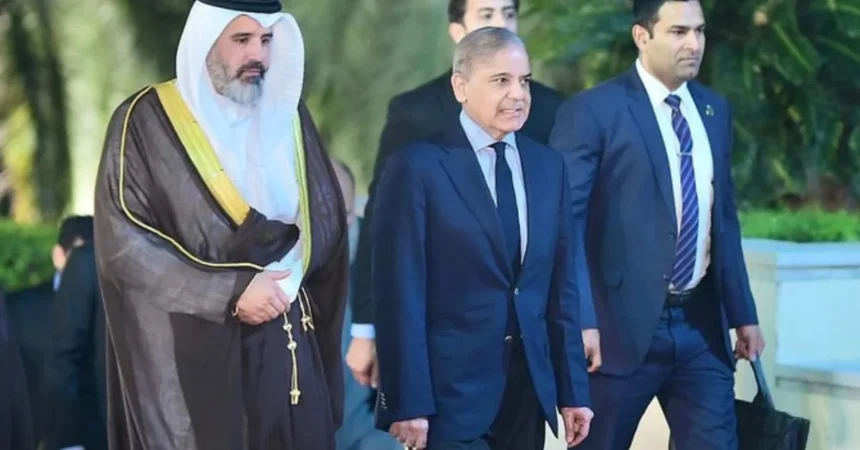In a significant development for Pakistan’s economic landscape, Prime Minister Shehbaz Sharif has announced that the country is poised to sign agreements worth $2 billion with Saudi Arabia. This announcement comes at a crucial time when Pakistan is grappling with economic challenges, including inflation, currency depreciation, and the need for foreign investment to bolster its fiscal situation. The impending agreements reflect Pakistan’s ongoing efforts to strengthen its ties with Saudi Arabia, a key ally in the Middle East.
- Background: Pakistan and Saudi Arabia Relations
- The Nature of the Agreements
- Economic Context: Challenges Facing Pakistan
- Diplomatic Significance of the Agreements
- Anticipated Impact on Pakistan’s Economy
- Regional and Global Implications
- Challenges Ahead
- The Role of International Observers
- A Step Towards Economic Recovery
Background: Pakistan and Saudi Arabia Relations
The relationship between Pakistan and Saudi Arabia has historically been strong, characterized by deep-rooted cultural, religious, and economic ties. Saudi Arabia has been a significant supporter of Pakistan, providing financial assistance, investing in infrastructure projects, and offering employment opportunities for Pakistani workers. The Kingdom has also played a vital role in Pakistan’s energy sector, helping the country navigate its energy crises.
In recent years, the relationship has faced challenges due to regional geopolitical dynamics and shifts in global oil markets. However, the two nations have continued to collaborate on various fronts, including defense, trade, and energy. The anticipated agreements are expected to further solidify this partnership and enhance bilateral cooperation in key sectors.
The Nature of the Agreements
While specific details about the agreements are still emerging, Prime Minister Shehbaz Sharif indicated that they will encompass a range of sectors, including energy, infrastructure, and investment. The agreements aim to facilitate increased Saudi investment in Pakistan, which is crucial for addressing the country’s pressing economic challenges.
One of the key areas of focus is the energy sector. Saudi Arabia has a wealth of experience and resources in energy production and technology, and its involvement in Pakistan’s energy infrastructure could significantly boost the country’s energy security. This could involve investments in renewable energy projects, oil and gas exploration, and the development of energy-efficient technologies.
In addition to energy, the agreements may also cover infrastructure development projects, a critical area for Pakistan’s economic growth. The country has long struggled with inadequate infrastructure, which hampers its ability to attract foreign investment and develop its economy. Saudi investment in this sector could lead to improved transportation networks, urban development, and enhanced public services, ultimately benefiting the Pakistani populace.
Economic Context: Challenges Facing Pakistan
Pakistan’s economy has faced numerous challenges in recent years, exacerbated by a combination of domestic mismanagement and global economic conditions. The country has grappled with high inflation, a depreciating currency, and growing fiscal deficits, which have put immense pressure on its economic stability. In this context, foreign investment is essential for revitalizing the economy and addressing these challenges.
The government’s ability to secure substantial foreign investment, particularly from a powerful ally like Saudi Arabia, is a significant step towards economic recovery. The anticipated agreements are seen as a potential lifeline for Pakistan, providing much-needed financial resources and stability. Furthermore, they may signal to other potential investors that Pakistan is a viable market, capable of fostering business growth and development.
Diplomatic Significance of the Agreements
The signing of these agreements also carries significant diplomatic implications. It showcases Pakistan’s commitment to strengthening its strategic ties with Saudi Arabia and highlights the Kingdom’s role as a crucial partner in the region. The agreements could pave the way for increased collaboration on various fronts, including counter-terrorism, regional security, and economic development.
Saudi Arabia’s influence in the Middle East is significant, and its partnership with Pakistan can enhance Pakistan’s standing in the region. By aligning itself more closely with Saudi Arabia, Pakistan may strengthen its position in regional geopolitics, fostering greater cooperation with other Gulf nations and bolstering its diplomatic clout.
Moreover, this partnership aligns with Saudi Arabia’s Vision 2030, an ambitious initiative aimed at diversifying the Kingdom’s economy and reducing its reliance on oil. As part of this vision, Saudi Arabia is actively seeking investment opportunities abroad, and Pakistan offers a promising market for various sectors. The agreements could facilitate joint ventures, technology transfer, and knowledge sharing, benefitting both nations in the long run.
Anticipated Impact on Pakistan’s Economy
The expected influx of $2 billion in investment from Saudi Arabia could have several positive impacts on Pakistan’s economy. Firstly, it may provide immediate financial relief, helping the government address its fiscal challenges and stabilize its currency. This influx could lead to improved investor confidence, encouraging both local and international businesses to invest in Pakistan.
Additionally, the agreements could stimulate job creation, particularly in sectors such as construction, energy, and technology. With Saudi investment directed towards infrastructure development, many Pakistanis may benefit from new employment opportunities, contributing to poverty alleviation and economic growth.
Furthermore, the partnerships established through these agreements may lead to knowledge transfer and capacity building within Pakistan. Collaboration with Saudi experts and businesses can enhance local expertise, drive innovation, and improve overall productivity in various sectors. This knowledge sharing can play a crucial role in fostering sustainable economic development in the long term.
Regional and Global Implications
The agreements between Pakistan and Saudi Arabia also have broader implications for the region and the global economy. As two key players in the South Asian and Middle Eastern geopolitical landscape, their partnership can contribute to regional stability and security. Increased collaboration on counter-terrorism efforts and trade could enhance economic ties and foster a more secure environment for business operations.
Moreover, the partnership may also influence the dynamics of foreign investment in the region. As Saudi Arabia seeks to diversify its investments, it may encourage other Gulf nations to follow suit, creating a ripple effect that enhances economic ties across the region. This could lead to increased competition for investment opportunities in Pakistan, ultimately benefiting the country.
Challenges Ahead
Despite the positive outlook surrounding the agreements, several challenges remain. Pakistan must navigate its internal political landscape to ensure that the agreements are implemented effectively and transparently. Political instability, bureaucratic inefficiencies, and corruption can hinder the successful execution of these agreements and limit the potential benefits for the country.
Additionally, the effectiveness of the agreements will depend on the Pakistani government’s ability to create an enabling environment for foreign investment. This includes addressing regulatory barriers, improving infrastructure, and ensuring a stable macroeconomic framework. If these issues are not adequately addressed, Pakistan risks missing out on the full potential of the investment from Saudi Arabia.
The Role of International Observers
International observers and financial institutions are closely monitoring the situation in Pakistan, particularly in light of the anticipated agreements with Saudi Arabia. The International Monetary Fund (IMF), World Bank, and other multilateral organizations have a vested interest in Pakistan’s economic stability, as it has broader implications for regional security and economic growth.
These institutions may offer additional support and guidance to Pakistan as it navigates its economic challenges and works to implement the agreements effectively. Their involvement can provide crucial expertise and resources, enhancing Pakistan’s ability to achieve its economic objectives.
A Step Towards Economic Recovery
The impending signing of agreements worth $2 billion with Saudi Arabia represents a significant opportunity for Pakistan to strengthen its economic foundations and enhance its diplomatic relations in the region. While the challenges are substantial, the potential benefits of these agreements are equally significant. By fostering collaboration across key sectors, Pakistan can work towards achieving sustainable economic growth and stability.
As the government moves forward with the agreements, it will be essential to prioritize transparency, accountability, and effective implementation. By doing so, Pakistan can maximize the impact of the investments and lay the groundwork for a brighter economic future.
#Pakistan #SaudiArabia #Investment #EconomicDevelopment #PMShehbaz #BilateralAgreements #MiddleEast #ForeignInvestment #Karachi #Infrastructure #EnergySector #Geopolitics #Vision2030 #EconomicRecovery







